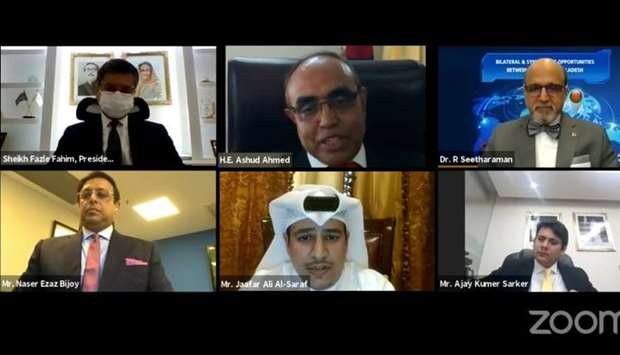Doha Bank hosted a webinar on Wednesday on the theme “Bilateral and synergistic opportunities between Qatar and Bangladesh”.
The event witnessed participation from Jaafar Ali al-Saraf, vice president, Bangladesh Forum Qatar and vice chairman, Gulf Exchange; Ashud Ahmed, Bangladesh ambassador; Dr R Seetharaman, Doha Bank chief executive officer; Naser Ezaz Bijoy, country chief executive officer, Standard Chartered Bank Bangladesh; and Sheikh Fazle Fahim, president, Federation of Bangladesh Chambers of Commerce and Industries (FBCCI).
Al-Saraf spoke about the two countries sharing excellent relations and working towards increasing the bilateral trade.
Ambassador Ahmed spoke about the Covid-19 related challenges the Bangladesh economy and the steps leaders have taken to address the situation.
He said Qatar-Bangladesh enjoy excellent relations, the countries have supported each other in the international forums. He said both governments hold keen desire to strengthen relationship.
Ahmed mentioned about the remittances growth over the last five years, currently reached $1bn from Qatar.
He said the country produces “medicines of finest quality” approved by US and are cost effective. Bangladesh is a land of opportunities other than importing labour.
He also mentioned that Qatar has been resilient post the blockade and has become self-reliant in many sectors, Bangladesh can become a partner with Qatar.
Bijoy described Bangladesh as “Best kept secret of Asia” and spoke on inherent strengths of the economy, the growth of apparel sector, remittances, power generation, infrastructure and digital space.
The demographic dividend of the country lies as major age bracket in the 25 to 54 years range; he said the economy has transformed itself into middle-income group.
He expects in the next five years the economy will add $0.5tn, which will be like adding Vietnam to itself. He discussed about investing in government bonds as yields are attractive and currency is stable.
Fahim spoke about the vision of Bangladesh of sustainable development, expansion in hydrocarbon segment, expanding value chains and service trade.
He said Qatar is keen to invest in Bangladesh energy sector, LPG storage terminals, power and infra sector. He discussed the fiscal and monetary policy and mentioned that income taxes were reduced with corporate taxes being reduced by 2.5%.
Dr R Seetharaman said Bangladesh has been stable in politics and finance and it is important to build blocks between Qatar-Bangladesh to expand the trade.
The country is going to transform given its macro-economic fundamentals and middle-income segment. The next five years will be defining moment for the economy. The policy governance has been exemplary.
The country has mapped economic, social, environment and human risks successfully to continue its growth momentum.
On Bangladesh economy and Qatar – Bangladesh bilateral relationships, he said, “According to IMF report in June 2020, Bangladesh expected to grow by 2% in 2020. Bangladesh forex reserves are at $32bn in July 2020.
Qatar Bangladesh trade was close to $1bn in 2018-19.
In June 2017, Bangladesh entered into agreement with the then RasGas to supply 2.5mn tonnes of LNG over a period of 15 years.
On global economy, he cited the IMF June 2020 report and said, “Global economy growth is projected at –4.9% in 2020, Growth in the advanced economy group is projected at –8% in 2020, growth in the group of emerging market and developing economies is forecast at –3% in 2020.”
On Qatar’s economy, Seetharman said, “Qatar has a world class seaport, airport, free zones, a new public-private partnership model and an approved Foreign Investment Law to promote non-Qatari investments.”
Qatar is an ‘AA-‘ rated country and Doha Bank is rated ‘A3’ with stable outlook. The country has a sovereign fund plus gold reserves with central bank, which is twice its GDP and has adequate financial reserves reflecting inherent strength of the economy.
The current increase in LNG production capacity from 77mn tpy to 110mn tpy by 2025 and further to 127mn tpy reflects the country’s strong fundamentals.
Seetharaman said the ‘Tatweer’ programme “offers infra, office space, introduce business and helps in creating entire value chain to support SMEs in Qatar.”
Qatar Development Bank can help in providing equity whereas debt can be funded by other banks. From an investment perspective, Doha Bank can explore debt and equity, given the macro-economic fundamentals of the country.

